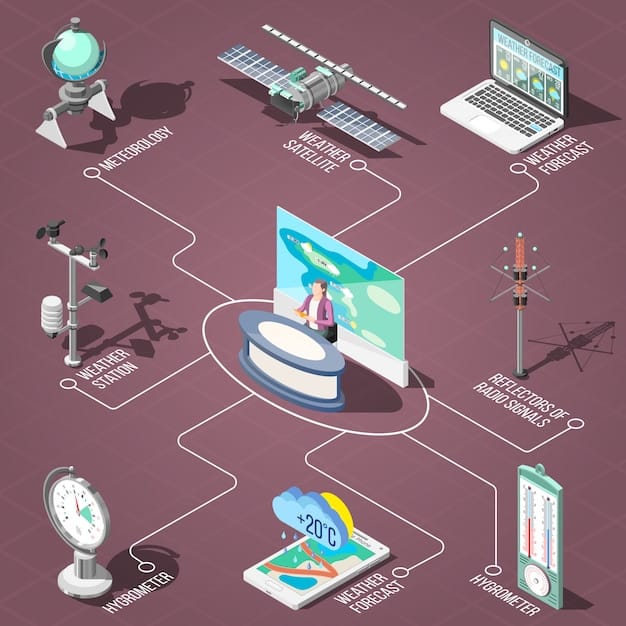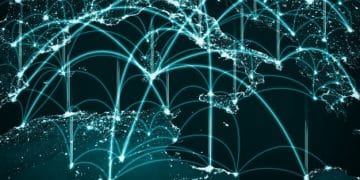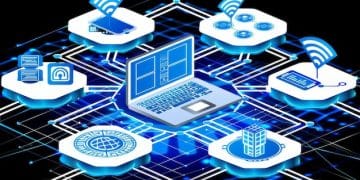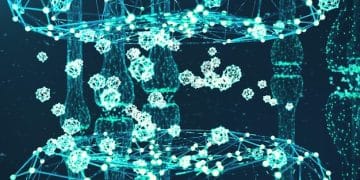Blockchain Oracles in the US: Bridging On-Chain and Off-Chain Data

Blockchain oracles are essential for connecting blockchain technology with real-world data in the US market, enabling smart contracts to access and utilize information from external sources, thereby expanding the range of applications for blockchain technology.
In the rapidly evolving landscape of blockchain technology, the ability to integrate real-world data into on-chain systems is paramount. This is where blockchain oracles: bridging the gap between on-chain and off-chain data in the US market, play a crucial role, enabling smart contracts to interact with external information, thereby unlocking a multitude of new applications and use cases.
Understanding Blockchain Oracles
Blockchain oracles serve as bridges between blockchains and the external world. They feed external data into smart contracts, enabling these contracts to execute actions based on real-world information.
Without oracles, smart contracts would be isolated, unable to react to events outside the blockchain environment. This limitation severely restricts their potential applications, making oracles a critical component of the broader blockchain ecosystem.
The Role of Oracles in Smart Contracts
Oracles are pivotal in making smart contracts truly “smart” by providing them with the necessary data to execute complex logic based on real-world conditions.
- Data Provision: Oracles supply data from various sources, such as price feeds, weather conditions, and event outcomes.
- Smart Contract Execution: Smart contracts use this data to trigger actions, such as settling financial agreements or executing insurance payouts.
- Enhanced Functionality: By connecting to oracles, smart contracts can automate processes that would otherwise require manual intervention.
Types of Blockchain Oracles
Oracles come in various forms, each with its own strengths and weaknesses. Understanding the different types is crucial for selecting the right oracle for a specific application.
- Software Oracles: These oracles retrieve data from online sources, such as APIs and web servers.
- Hardware Oracles: Hardware oracles use physical sensors to gather data, like temperature or GPS coordinates.
- Consensus-Based Oracles: These oracles rely on multiple sources to verify data accuracy, enhancing reliability.

In summary, blockchain oracles are essential for expanding the capabilities of smart contracts by providing them with access to real-world data. The different types of oracles cater to various data needs, making them a versatile component of the blockchain ecosystem.
The US Market and the Need for Oracles
The US market, known for its innovation and regulatory complexity, presents both opportunities and challenges for blockchain oracles. The demand for reliable data integration is high, driven by sectors like finance, supply chain management, and insurance.
However, navigating the legal and compliance landscape is crucial for ensuring the widespread adoption of blockchain oracles in the US.
Finance and Oracles
In the financial sector, oracles are used to provide real-time price feeds, enabling decentralized exchanges (DEXs) and other DeFi applications to function accurately.
Reliable price data is essential for maintaining the integrity of these systems, protecting users from manipulation and ensuring fair trading conditions.
Regulation and Compliance
The US regulatory environment for blockchain technology is still evolving. Oracles must comply with existing laws and regulations, such as data privacy and security requirements.
- Data Privacy: Oracles must handle sensitive data responsibly, adhering to regulations like GDPR and CCPA.
- Security: Robust security measures are needed to prevent data breaches and ensure the integrity of the information provided to smart contracts.
- Compliance: Oracles must stay informed about changes in regulations and adapt their practices accordingly.
Use Cases in Supply Chain Management
Oracles can track the movement of goods through the supply chain, providing transparency and accountability. This can help reduce fraud, improve efficiency, and enhance consumer trust.
- Tracking: Oracles can monitor the location and condition of goods in real-time.
- Verification: They can verify the authenticity of products, preventing counterfeiting.
- Automation: Oracles can automate processes such as customs clearance and payment settlement.
In conclusion, the US market offers significant opportunities for blockchain oracles, particularly in finance and supply chain management. However, navigating the regulatory landscape and ensuring compliance are critical for successful adoption.
Challenges and Solutions in Oracle Implementation
Implementing blockchain oracles is not without its challenges. These include ensuring data accuracy and security, as well as addressing the oracle problem, which refers to the trust placed in oracles as sources of truth.
Various solutions have been developed to mitigate these challenges, enhancing the reliability and security of oracle systems.
Data Accuracy and Verification
Ensuring the accuracy of data provided by oracles is paramount. Inaccurate data can lead to incorrect execution of smart contracts, resulting in financial losses or other negative consequences.
- Multiple Sources: Using multiple data sources and cross-referencing information can help identify and correct errors.
- Reputation Systems: Implementing reputation systems that reward accurate oracles and penalize inaccurate ones can incentivize good behavior.
- Data Validation: Employing data validation techniques to check for anomalies and inconsistencies can improve data quality.
Security Considerations
Security is crucial for preventing malicious actors from manipulating oracle data. Compromised oracles can lead to manipulation of smart contracts and theft of funds.
- Encryption: Using encryption to protect data in transit and at rest can prevent unauthorized access.
- Decentralization: Decentralizing the oracle network can reduce the risk of a single point of failure.
- Auditing: Regular security audits can identify vulnerabilities and ensure that security measures are up to date.
Addressing the Oracle Problem
The oracle problem refers to the challenge of trusting oracles as reliable sources of information. Since oracles are external to the blockchain, they are not subject to the same level of trust as on-chain components.
Solutions to the oracle problem include using decentralized oracles, reputation systems, and economic incentives to ensure honesty.
In summary, implementing blockchain oracles involves addressing challenges related to data accuracy, security, and trust. Solutions such as using multiple data sources, implementing security measures, and addressing the oracle problem are crucial for successful implementation.
Decentralized Oracles vs. Centralized Oracles
The architecture of blockchain oracles significantly impacts their security, reliability, and resistance to manipulation. Two primary models exist: decentralized oracles and centralized oracles.
Decentralized oracles offer enhanced security and reliability, while centralized oracles provide simplicity and speed.
Benefits of Decentralized Oracles
Decentralized oracles use multiple independent sources to verify data, reducing the risk of manipulation and increasing the reliability of the information they provide.
This approach enhances trust and resilience in the oracle system.
- Increased Security: By relying on multiple sources, decentralized oracles are less vulnerable to attacks and manipulation.
- Enhanced Reliability: The use of multiple sources ensures that data remains available even if one source fails.
- Improved Trust: Decentralized oracles enhance trust by removing the single point of failure associated with centralized systems.
Drawbacks of Decentralized Oracles
Despite their advantages, decentralized oracles can be more complex to implement and may incur higher costs due to the need for multiple data sources.
They may also experience slower response times compared to centralized oracles.
- Complexity: Implementing a decentralized oracle system can be technically challenging.
- Higher Costs: The need for multiple data sources and consensus mechanisms can increase costs.
- Slower Response Times: Reaching consensus among multiple sources can slow down the process of data retrieval.
Advantages of Centralized Oracles
Centralized oracles are simpler to implement and can provide faster response times, making them suitable for applications where speed is critical.
However, they are more vulnerable to manipulation and single points of failure.
- Simplicity: Centralized oracles are easier to set up and manage.
- Speed: They can provide faster response times compared to decentralized oracles.
- Lower Costs: Centralized systems typically incur lower costs due to their simplicity.
In conclusion, the choice between decentralized and centralized oracles depends on the specific requirements of the application. Decentralized oracles offer enhanced security and reliability, while centralized oracles provide simplicity and speed.
Future Trends in Blockchain Oracles
The field of blockchain oracles is constantly evolving, with new innovations emerging to address existing limitations and unlock new possibilities. Some key trends include the development of more sophisticated oracle protocols and the integration of oracles with AI and machine learning.
These advancements promise to enhance the capabilities and applications of blockchain technology in the US market.
Advancements in Oracle Protocols
New oracle protocols are being developed to improve data accuracy, security, and efficiency. These protocols often incorporate advanced techniques such as cryptographic verification and economic incentives.
- Cryptographic Verification: Using cryptographic techniques to verify the integrity of data can enhance security.
- Economic Incentives: Rewarding accurate oracles and penalizing inaccurate ones can incentivize good behavior.
- Improved Efficiency: Optimizing oracle protocols can reduce latency and improve scalability.
Integration with AI and Machine Learning
Integrating oracles with AI and machine learning can enable smart contracts to process more complex data and make more informed decisions. This opens up new possibilities for applications like predictive analytics and automated risk management.
- Predictive Analytics: AI-powered oracles can provide smart contracts with predictive insights, enabling them to anticipate future events.
- Automated Risk Management: Oracles can monitor risk factors and automatically adjust smart contract parameters to mitigate potential losses.
- Data Enrichment: AI can enrich data provided by oracles, making it more valuable and actionable.
Cross-Chain Oracles
Cross-chain oracles enable smart contracts on one blockchain to access data from other blockchains, facilitating interoperability and enabling new types of decentralized applications.
This is particularly useful for applications that require data from multiple blockchain networks.
In summary, the future of blockchain oracles involves advancements in oracle protocols, integration with AI and machine learning, and the development of cross-chain oracles. These trends promise to enhance the capabilities and applications of blockchain technology in the US market.
Case Studies: Successful Oracle Implementations in the US
Several successful implementations of blockchain oracles in the US market demonstrate the potential of this technology across various industries. These case studies provide valuable insights into the benefits and challenges of using oracles in real-world applications.
They highlight the transformative impact of oracles in enhancing transparency, efficiency, and security.
Chainlink in Decentralized Finance (DeFi)
Chainlink, a leading decentralized oracle network, has been widely adopted in the DeFi space. It provides reliable price feeds to decentralized exchanges (DEXs) and lending platforms, enabling them to function accurately.
- Accurate Price Feeds: Chainlink ensures that DEXs and lending platforms have access to real-time, accurate price data.
- Secure Transactions: By providing reliable data, Chainlink helps protect users from manipulation and ensures fair trading conditions.
- Increased Liquidity: Accurate price feeds attract more users and liquidity to DeFi platforms.
Provable (Oraclize) in Supply Chain Management
Provable (formerly Oraclize) has been used to track the movement of goods through the supply chain, providing transparency and accountability. This has helped reduce fraud, improve efficiency, and enhance consumer trust.
- Real-Time Tracking: Provable enables real-time tracking of goods, providing up-to-date information on their location and condition.
- Verification of Authenticity: It can verify the authenticity of products, preventing counterfeiting.
- Automated Processes: Provable automates processes such as customs clearance and payment settlement, reducing manual intervention.
API3 in Insurance
API3 has been utilized in the insurance industry to automate claims processing and reduce fraud. By connecting smart contracts to real-world data sources, API3 enables insurance companies to streamline their operations and improve customer service.
In conclusion, successful implementations of blockchain oracles in the US market demonstrate the potential of this technology across various industries. These case studies highlight the benefits of using oracles in enhancing transparency, efficiency, and security.
| Key Point | Brief Description |
|---|---|
| 🔗 Oracle Definition | Bridges connecting blockchain to external data. |
| 🏛️ US Market | High demand in Finance and Supply Chains, complex regulations. |
| 🛡️ Security | Decentralized oracles offer better security. |
| 🤖 AI Integration | AI-powered oracles enable predictive analytics. |
Frequently Asked Questions
▼
A blockchain oracle is a third-party service that connects blockchains to external systems, enabling smart contracts to execute based on real-world data, bridging the gap between on-chain and off-chain environments.
▼
Oracles are necessary because blockchains cannot inherently access external data. They bring external information into the blockchain, allowing smart contracts to respond to real-world events automatically.
▼
The main types include software oracles (using APIs), hardware oracles (using sensors), and human oracles (relying on human input). Decentralized oracles enhance reliability through multiple sources.
▼
The primary risk is data manipulation. If an oracle provides inaccurate or malicious data, the smart contract will execute incorrectly. Decentralization and reputation systems mitigate this risk.
▼
In the US, blockchain oracles are used in finance (DeFi, price feeds), supply chain management (tracking), and insurance (claims processing), enhancing transparency and automating processes across these sectors.
Conclusion
In conclusion, blockchain oracles are vital for bridging the gap between on-chain and off-chain data, enabling smart contracts to interact with the real world. The US market presents unique opportunities and challenges for oracle implementation, with ongoing advancements promising to enhance their capabilities and applications.





